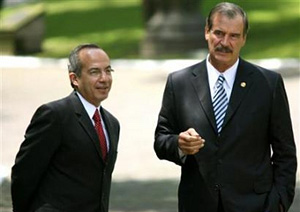 |
 |
 |
 Editorials | At Issue | September 2006 Editorials | At Issue | September 2006  
Mexico's Next President Knows Legislative Politics
 Marion Lloyd & Dudley Althaus - Houston Chronicle Marion Lloyd & Dudley Althaus - Houston Chronicle


| | Mexico's President Vicente Fox (R) talks with Felipe Calderon, Mexico's president-elect, at the presidential residence Los Pinos in Mexico City September 6, 2006. [Reuters] |
Uncharismatic, wonkish and often short-tempered, Mexican President-elect Felipe Calderon has perhaps the weakest mandate in this country's modern history.

And he'll take the reins Dec. 1 of a nation addled by poverty, riddled with crime and violence, saddled with a deep political and social divide.

That's a recipe for disaster, right? Not necessarily, some analysts say.

Calderon's sometimes abrasive personal style, years of political wrangling and deep experience with backroom deal-making could make governing easier for him than it has been for outgoing President Vicente Fox, analysts say.

"He's a very different kind of politician than Fox," said analyst Federico Estevez, who has known Calderon for decades. "He likes high party politics. He likes Congress."

"He understands legislative politics, which wasn't the case with Fox."

Negotiating skills and selective arm-twisting will prove essential as Calderon seeks to unite a nation torn by the July 2 elections, which his opponents claim were rigged.

On Tuesday, Mexico's top elections court certified Calderon's razor-thin victory — he won with little more than 35 percent of the vote, beating his closest rival by less than half a point — and named him president-elect.

"The electoral process has ended and it's the hour of unity and of accords," Calderon, 44, said during a forward-looking but somber victory speech at his party's Mexico City headquarters. "Only united can we defeat our real enemies: poverty, crime, unemployment and inequality."

But losing presidential hopeful Andres Manuel Lopez Obrador doesn't have talking in mind.

Leftist discord continues

After leading thousands of protesters in a weeks-long siege of downtown Mexico City that still continues, Lopez Obrador now vows to never recognize Calderon as a legitimate president and to do everything possible to make the country ungovernable.

It might not be an idle threat.

Newly elected legislators from Lopez Obrador's Democratic Revolutionary Party, or PRD, rushed the podium and prevented Fox from delivering his final state-of-the-nation speech to congress last Friday. And they vow to stonewall any of Calderon's legislative agenda.

But Calderon may not need the PRD's support to govern. The July election made his National Action Party — to which Fox also belongs — the largest block in both houses of congress.

And the center-right party, called the PAN, has recently renewed a tenuous alliance with the Institutional Revolutionary Party, the PRI, which ruled Mexico for most the 20th century. That could assure simple majority approval of contentious legislation.

Public opinion a tough sell

Many speculate that Calderon will offer Cabinet positions to the PRI, and other political parties, in return for their support on such hot-button issues as allowing private investment in the petroleum and electricity industries, reforming the labor code to weaken unions and revising the tax codes.

"It's very clear the PRI will generally be supporting the PAN, and that they'll be able to get legislation through," said analyst Jeffrey Weldon, an expert on Mexico's congress. "The PRI seems to be more interested than they were six years ago in entering a formal, Cabinet-type coalition."

Public opinion might be a tougher sell. Polls show a majority of Mexicans see Calderon as the legitimate president. But as much as a third of the country, and significant majorities in the Mexico City area and impoverished southern states, do not.

"Felipe Calderon was validated by the courts, but not by the people," said Guadalupe Loaeza, a widely read newspaper columnist who supports Lopez Obrador. "This is no triumph."

Calderon's fragile victory means "he doesn't have any choice" but to incorporate much of Lopez Obrador's social programs into his government's policies, Loaeza said.

Some analysts say Calderon has already shown a readiness to reach out to leftist critics — as evidenced by the vow in his victory speech Tuesday to make fighting poverty a primary goal.

"I didn't hear the speech of a triumphant winner," said Sergio Aguayo, a left-leaning democracy activist and scholar. "At least, Felipe's recognizing this reality that the country is deeply divided."

marionlloyd@gmail.com dqalthaus@yahoo.com | 
 | |
 |



